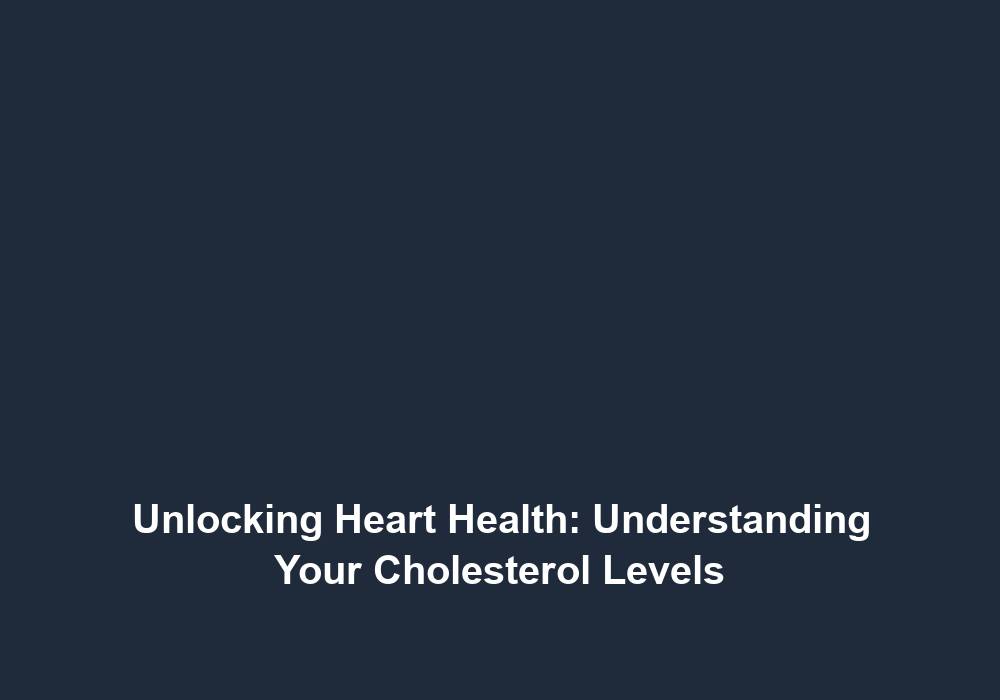Unlocking Heart Health: Understanding Your Cholesterol Levels
Cholesterol is a waxy, fat-like substance that is produced by our liver and also found in certain foods. While it is necessary for our body to function properly, having high levels of cholesterol can put us at risk for heart disease and other health problems. Understanding your cholesterol levels is essential for maintaining heart health and preventing potentially life-threatening conditions. In this article, we will delve into the different types of cholesterol, their impact on your health, and ways to manage and improve your cholesterol levels.
The Different Types of Cholesterol
When we talk about cholesterol, it’s important to understand that there are different types. These include:
-
Low-Density Lipoprotein (LDL) Cholesterol: Often referred to as bad cholesterol, LDL cholesterol can build up in the walls of your arteries, leading to atherosclerosis (the hardening and narrowing of arteries) and increasing the risk of heart disease. It is crucial to keep LDL cholesterol levels within a healthy range to prevent the formation of plaque that can restrict blood flow to the heart.
-
High-Density Lipoprotein (HDL) Cholesterol: Known as good cholesterol, HDL cholesterol helps remove LDL cholesterol from the arteries and transports it to the liver for elimination from the body. Having high levels of HDL cholesterol is beneficial for heart health as it plays a key role in reducing the risk of plaque buildup and maintaining healthy blood vessels.
-
Triglycerides: Triglycerides are a type of fat found in the blood. They are stored in fat cells and used as a source of energy. However, high levels of triglycerides, particularly in combination with high LDL cholesterol or low HDL cholesterol, can contribute to the development of cardiovascular disease. It is important to manage triglyceride levels to reduce the risk of heart-related complications.
Understanding Cholesterol Levels
To understand your cholesterol levels, a lipid profile test is performed. This test measures the levels of LDL cholesterol, HDL cholesterol, and triglycerides in your blood. The results are usually expressed in milligrams per deciliter of blood (mg/dL). Here’s a breakdown of the different levels:
-
LDL Cholesterol:
- Optimal: Less than 100 mg/dL
- Near or above optimal: 100-129 mg/dL
- Borderline high: 130-159 mg/dL
- High: 160-189 mg/dL
- Very high: 190 mg/dL and above
-
HDL Cholesterol:
- Poor: Less than 40 mg/dL (men), less than 50 mg/dL (women)
- Better: 50-59 mg/dL
- Excellent: 60 mg/dL and above
-
Triglycerides:
- Normal: Less than 150 mg/dL
- Borderline high: 150-199 mg/dL
- High: 200-499 mg/dL
- Very high: 500 mg/dL and above
By understanding these levels, you can assess your current cholesterol status and work towards achieving optimal levels for better heart health.
The Impact of Cholesterol on Heart Health
Having high levels of LDL cholesterol and triglycerides, as well as low levels of HDL cholesterol, can contribute to the development of heart disease. Atherosclerosis occurs when LDL cholesterol builds up in the arteries, forming plaque. This plaque can restrict blood flow to the heart, leading to chest pain (angina), heart attacks, and other cardiovascular complications. Therefore, it is crucial to manage LDL cholesterol and triglyceride levels to reduce the risk of atherosclerosis and its associated complications.
On the other hand, HDL cholesterol helps remove excess LDL cholesterol from the arteries, reducing the risk of plaque buildup. It acts as a scavenger, transporting LDL cholesterol to the liver for processing and elimination. High levels of HDL cholesterol are associated with a lower risk of heart disease. Therefore, it is important to focus on increasing HDL cholesterol levels through lifestyle modifications and medications if necessary.
Triglycerides, when elevated, can also increase the risk of heart disease. They are often linked to other risk factors such as obesity, diabetes, and metabolic syndrome. High triglyceride levels can contribute to the development of inflammation in the arteries, further promoting atherosclerosis. Managing triglyceride levels through lifestyle changes, such as adopting a healthy diet and engaging in regular physical activity, can help reduce the risk of heart-related complications.
Managing and Improving Cholesterol Levels
Maintaining healthy cholesterol levels is crucial for heart health. Here are some strategies that can help manage and improve your cholesterol levels:
-
Adopt a Heart-Healthy Diet:
- Reduce intake of saturated fats and trans fats found in red meat, full-fat dairy products, and processed foods. These fats can raise LDL cholesterol levels and increase the risk of heart disease.
- Increase consumption of fruits, vegetables, whole grains, and lean proteins. These foods are rich in nutrients and fiber that can help lower LDL cholesterol and improve overall heart health.
- Incorporate sources of healthy fats such as avocados, nuts, and olive oil. These fats, when consumed in moderation, can contribute to higher levels of HDL cholesterol and lower levels of LDL cholesterol.
-
Engage in Regular Physical Activity:
- Aim for at least 150 minutes of moderate-intensity aerobic exercise per week. This can include activities like brisk walking, cycling, swimming, or dancing.
- Include activities that raise your heart rate and promote cardiovascular fitness. These activities can help lower LDL cholesterol and triglyceride levels, while also increasing HDL cholesterol.
- Consult with your healthcare provider before starting any new exercise regimen to ensure it is safe and appropriate for your individual health needs.
-
Maintain a Healthy Weight:
- Losing excess weight can help improve cholesterol levels. Excess weight, especially around the waist, is often associated with higher levels of LDL cholesterol and triglycerides.
- Focus on a balanced diet and regular exercise to achieve a healthy weight. This combination can not only help improve cholesterol levels but also reduce the risk of other chronic diseases.
-
Quit Smoking and Limit Alcohol Consumption:
- Smoking damages blood vessels and lowers HDL cholesterol levels. It also increases the risk of blood clots and heart disease.
- Excessive alcohol consumption can increase triglyceride levels and contribute to weight gain. Limiting alcohol intake or avoiding it altogether can help improve cholesterol levels and overall heart health.
-
Take Medications as Prescribed:
- If lifestyle modifications are not sufficient to manage cholesterol levels, your healthcare provider may prescribe medications like statins to help lower LDL cholesterol. These medications work by blocking the production of cholesterol in the liver and can be effective in reducing LDL cholesterol levels.
It’s important to regularly monitor your cholesterol levels through blood tests and consult with your healthcare provider for personalized advice and guidance. They can help assess your risk factors, provide recommendations tailored to your specific needs, and monitor the effectiveness of any interventions.
Conclusion
Understanding your cholesterol levels is essential for unlocking heart health. By comprehending the different types of cholesterol, their impact on your health, and implementing strategies to manage and improve your cholesterol levels, you can reduce the risk of heart disease and other related conditions. Remember to prioritize a heart-healthy lifestyle by adopting a balanced diet, engaging in regular physical activity, maintaining a healthy weight, and following your healthcare provider’s recommendations. Taking control of your cholesterol levels will empower you to lead a heart-healthy life.







